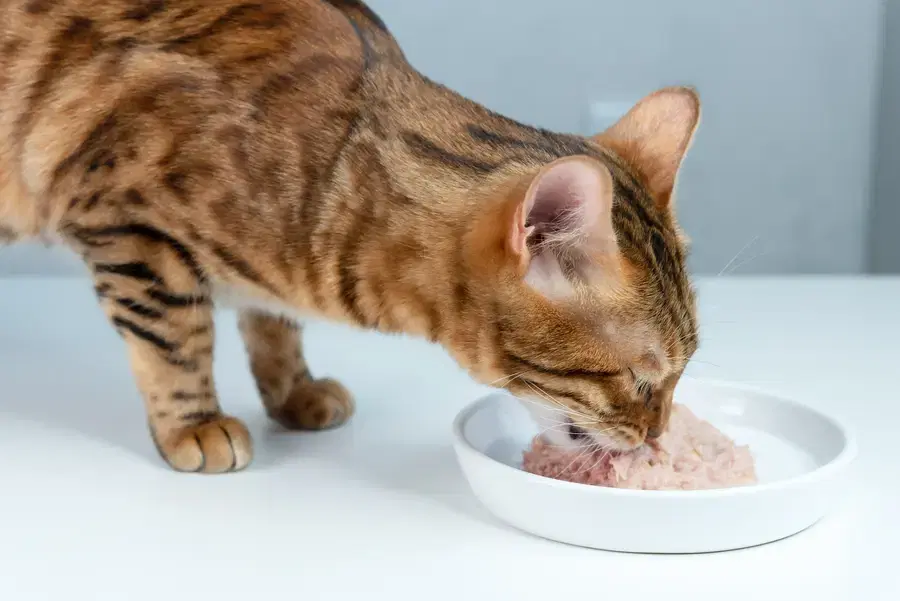Globally, more than 50 billion chickens are farmed each year, showcasing the widespread popularity of chicken-based dishes.
Can I Feed My Cat Chicken?
Yes, cooked chicken is generally safe for cats, but raw chicken and chicken bones are not recommended. Before introducing chicken into your cat's diet, it's essential to understand how to prepare the chicken, how much is safe to give a cat, and how often you should let your cat have chicken.
Do Cats Like Chicken?
Cats are carnivorous. This means that the majority of their diet should come from meat and related food items. Chicken and turkey are two popular choices for pet parents who want to add a treat to their cat's food. The high protein content, appealing taste, and interesting texture are all the reasons that cats love chicken. However, before introducing chicken into your cat's diet, there is one question that you need the answer to, is chicken healthy for cats?
Is Chicken Good for Cats?
Eating chicken can provide several benefits to your cat.1 This list of benefits can include:
Proteins – The high-quality protein found in chicken supports a cat's muscle development, growth, and overall health. It also helps to support a healthy coat.
Amino Acids – Taurine, which is vital for cats, is found in chicken. Taurine deficiency can lead to severe health issues, including heart problems and vision impairments.
Vitamins – Vitamins and minerals like vitamin B6, niacin, phosphorus, and selenium are also present in chicken and help maintain a strong immune system.
Hydration – Chicken can be a good source of moisture for your cat, lowering their risk of dehydration.
The palatability of chicken for cats is an additional benefit.1
What About Chicken Bones for Cats?
Raw bones can be beneficial for your cat. They can help improve a cat's dental health, organ health, nerve function, and joint and tendon health, in addition to helping maintain a healthy coat. But bones can be a choking hazard for your pet.2 This is why, cooked bones are a big no-no for your cat as they can become soft and brittle. The benefits chicken bones can offer your cat can be found in other, less risky food sources. We recommend keeping chicken bones away from your cat and using a different cat treat instead.
How Should You Feed Chicken to Your Cat?
Here are a few tips on how to prepare chicken for your cat, and how to introduce it into their diet.
Cooked chicken: Opt for cooked chicken, preferably baked or boiled, to help eliminate harmful bacteria and parasites like Salmonella and E. coli that can be present in raw chicken.
Avoid fancy preparations: While you may enjoy your chicken seasoned with spices and oils, they can quickly make your cat sick. Spices and oils can adversely affect your cat's digestive tract and lead to severe complications. Only feed your cat plain, unseasoned chicken.
Offer a variety: While a lot of pet parents will give their cat chicken breast, other parts, for example, chicken liver, can also make great treats for your cat. Different parts of the chicken can also introduce a different set of nutrients to your cat's diet.
Supervise Your Cat: If you feed your cat a piece of chicken with bones, avoid leaving them alone while they are eating it. Because bones can be a choking hazard, you want to make sure to be nearby just in case. Alternatively, avoid giving your cat bones altogether.
What is the Downside of Feeding Chicken to a Cat?
Raw chicken poses risks such as vomiting, diarrhea, and food poisoning for both cats and humans. Read about the signs and symptoms of poisoning. And for cooked chicken, there should be a limit to the quantity. If your cat ends up eating raw or too much cooked chicken while you’re not looking, do the following –
Monitor for signs of illness: Keep an eye on your cat for any indications of discomfort or illness, which could manifest as lethargy, vomiting, or diarrhea.
Ensure hydration: Provide an ample supply of fresh water to help keep your cat well-hydrated.
Consult the vet: If you suspect that your cat may have ingested a bone and it appears to be uncomfortable, consult your veterinarian. While chicken bones usually pass through a cat's digestive tract, there is a risk of choking, making it prudent to exercise caution and avoid bones whenever possible.
Conclusion
Chicken can prove to be a very good source of protein and other nutrients for your cat. But it should only be used as a supplement or an occasional treat. High-quality cat food should be the primary source of nutrition for your cat. Also, remember to always cook the chicken before giving it to your cat, and make sure to keep the bones away from them.

Creative manager by day, pet enthusiast all the time! After 19 years with my dog (hopefully he wins the award for oldest pet in the world), I enjoy spending my days brainstorming tail-wagging content, and sniffing out the latest trends in the pet world.
“Can Cats Eat Chicken?” Iams, https://my.iams.asia/cat/cat-articles/can-cat-eat-chicken, accessed Jan. 5, 2024.
“Can Cats Eat Chicken?” Rover, https://www.rover.com/blog/can-cats-eat-chicken, accessed Jan. 5, 2024.
The information presented in this article is for educational and informational purposes only and does not constitute or substitute for the advice of your veterinarian.












